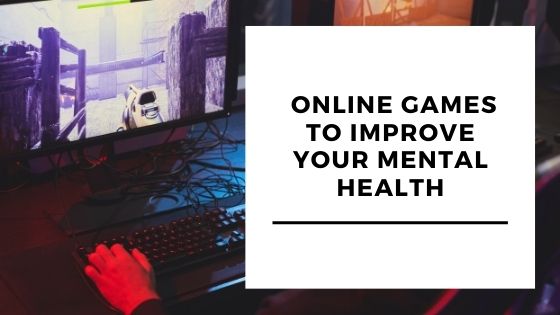Tuesday, 13 July 2021
Is Gaming Good For Your Mental Health: 3 Games To Improve Your Mental Health
Video games can play a beneficial role in improving your mental health. For decades, there have been a lot of research on the negative effects of gaming. Though we can't ignore this, the truth is video games are great for stimulating the brain. They also help to improve problem-solving, memory, and concentration when played in moderation.
Benefits of Video Games
Improves mental health disorders
Encourages mental stimulation
Builds emotional resilience
Improves social skills
Things To Note
It is important to set limits on how much time you will spend playing these games. Spending too much time on these games every day can lead to addiction. It can also lead to isolation and using the games to escape from your real life. Gaming is good for relaxation and easing stress but can cause problems if it's excessive.
3 Online Games To Improve Your Mental Health
Sudoku
This is a fun brain game that people of all ages and abilities can play. It is a logic game that challenges you to place the right numbers in boxes within a grid. Playing sudoku provides exercise and stimulation for the brain which can improve brain function according to a research study published in the International Journal Of Geriatric Psychiatry. It is also relaxing and gives a sense of satisfaction and achievement when you complete the puzzles.
Crossword Puzzles
Solving crossword puzzles boost your vocabulary, spelling, and knowledge of trivia. These benefits in turn increase your ability to think abstractly and your brain's processing power.
Research studies have shown that participating in activities like crossword puzzles can delay the onset of memory loss and alleviate dementia especially for those who are already at risk for Alzheimer's disease and dementia.
Role-Playing Games
A role-playing game is a game where the player assumes the role of a character throughout play. How you play your character depends on the person who created the game world and how you respond to the various events in it.
These games have been used by educators to help develop critical thinking and problem-solving skills. RPGs can also be used in a therapeutic sense for practicing desired skills like speaking up in a safe space and collaborating with others.
Recommended Online Game Websites
You don't have to download paid apps in order to get the benefits of video games. These websites are full of simple games you can play in your browser. And guess what? They are free!
1. Plays.org
This website offers hundreds of free and fun online games you can play directly from your browser. It's really easy to use. You don't have to download an app or register an account to use the website. Another great thing about this website is that there are no distractions from advertising and no paid upgrades either.
When playing the games, you don't have to worry about losing access to the internet because they are stored on the web browser. They have a wide variety of games for adults and children. Some games to try are the ultimate Sudoku timed puzzle game, which is a free online version of the classic Sudoku puzzle number game, and the Super Tetris logic puzzle game.
2. BestCrosswords.com
If you love crosswords, you will love this one. This website hosts a large supply of free crossword puzzles. They publish 15 grids daily. You don't need registration and you can play in your web browser, smartphone, tablet or print in high resolution.
3. Arkadium
This website has a large collection of online games you can play for free in your browser. You have to register to use this one and the advertisements can be distracting. Try Arkadium's Codeword, a word game that is a free online version of Codeword.
Tuesday, 6 July 2021
Why Journaling Is Good For Your Health
Journaling is writing down or keeping a record of your thoughts, experiences, insights, and feelings. It's simply writing down your thoughts and feelings so you can understand them more. It also helps your document your life.
If you have a chronic illness, keeping a journal can help you track your symptoms, drugs, and hospital visits. Keeping a journal is a great tool for managing not just your mental health, but also your physical health.
Health Benefits of Journaling
Stress Relief
Manage anxiety and depression
Strengthens Your Immune System
How To Get Started Writing a Journal
* Dust Off Your Pen and Paper – You don’t need anything special to keep a journal; in fact, purists believe that using pen and paper is the best way to journal because you can carry it with you anywhere and you don’t need technology. So, there will be no excuses.
* Do It First Thing in the Morning – Don’t procrastinate about keeping your journal. It’s best to do it in the morning before you begin your day so that you have the right frame of mind for the day. Plus, you only need five to ten minutes
* Do It Last Thing at Night – Another time to do it is before bed. This works especially well for gratitude journals. Write at least 3 things you are grateful for that day. That way you can go to sleep thinking about all the things you are grateful for instead of things you’re worried about. This is also useful for unloading your thoughts and concerns about the day on paper and you can free your mind for a good night's sleep.
* Write Often – Whenever you choose to do it, try to set it up so that it becomes a ritual and a habit. Journaling every day is going to be more effective than just doing it when you feel like it.
* Start Simply – Don’t start being worried about style and substance right now; just work on the daily habit with pen and paper (or if it’s easier for you, a computer or smartphone). Don’t make it hard - just get going.
* Begin with Today – Start right now and write about your day today. That’s the easiest thing to do. What of significance happened today? How did you feel about it? What would you do differently? What would you do the same?
* Try Different Types of Journals – Once you develop the habit, you can start trying different types of journaling like a bullet journal, or a vision journal, or maybe even a project journal for your next project.
* Keep It Private – The main thing to remember about your journal is that it should be kept private. The only exception is if you want to share thoughts with a therapist, counselor, or coach. Or if you want to turn it into a book or course, to help someone else overcome whatever you overcame.
How to Make Your Journaling More Effective
* Set Up a Comfy Journaling Spot – Find a good space you can journal in each day, one which is relaxing and without stress. Some people like to keep their journals by their bedside so that they can quickly write in their journals each night when they get into bed. Some people prefer to write sitting on their favorite chair while preparing for the day or even sitting at their desk. Just choose somewhere you find comfortable and will not be disturbed.
* Choose the Right Style of Journal for Your Needs – The type of journal you want to keep depends on how you plan to use it. You may want to track a project, in which case you’ll need a project journal. If you want to simply document your life, you’d want a classic journal.
* Use Your Journal to Work Through Life and Reach Goals – Don’t just write in the journal; actively seek to improve something in your life - whether it’s the thoughts that drive your feelings or improving your actions so that you experience more success. Write about your goals in different areas of your life and your plans to achieve them. You can also use your journals to document your successes and achievements and note areas of improvement.
* Consider Using More Than Writing to Document Your Life – You don’t need to just use text. You can use images, pictures, tickets, and other memories inside your journal too. Sometimes a few pictures and mementos mean more than anything you can write to help you remember.
* Read and Reflect Occasionally – Take at least a few minutes to re-read parts of your journal. Once you’ve kept it for a year, it’s fun to go back and read the same day from last year to find out what’s different now and what’s the same and why.
Keeping a journal will help you deal with the things that happen to you as well as the things that may happen in the future. Writing your experiences helps you remember what you did right and what you did wrong. It helps you improve your decision-making capacity for similar situations.
However, it won't solve all your problems. So, do seek the services of an experienced mental health professional if you need help.







